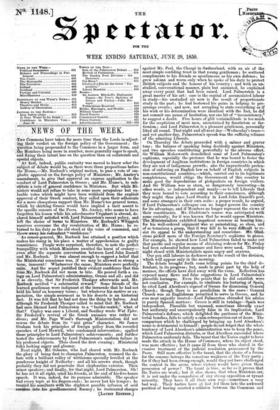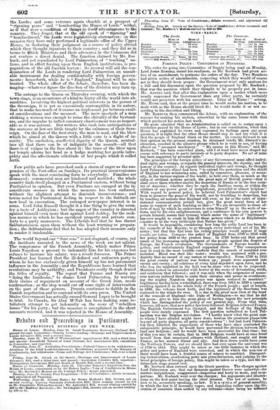NEWS OF THE WEEK.
-Tier. Commons have taken far more time than the Lords in adjust- ing their verdict on the foreign policy of the Government ; the question being propounded to the Commons in a larger form, and the Members being more in number, more generally eager to speak, and fixing their intent less on the question than on collaterals and special objects. AV first, indeed, public curiosity was moved to know what the
• subject of debate would be, as there were three propositions before _the House,—Mr. Roebuck's original motion, to pass a vote of em- phatic approval on the foreign policy of Ministers; Mr. Anstey's :amendment, to give that approval an express application to the -conduct of Lord Palmerston in Greece ; and Mr. Hume's, to sub- stitute ':vote of , general Confidence in Ministers. But while IC- nisters would not refuse to take in some more scrupulous but va- luable votes which might have been withheld from the explicit approval of their Greek conduct, they called upon their adherents for a more obsequious support than Mr. Hume's too general terms, 'which by shirking Greece would have implied a tacit assent to the specific censure of the Peers. Mr. Anstey, who seems to have forgotten his lesson while his schoolmaster 17rquhart is abroad, de- clared himself satisfied with Lord Palmerston's recent policy, and left the choice of terms to Ministers. Mr. Roebuck's Whiggish suasives overcame the shy recalcitration of Mr. Hume, he re- turned to his duty as the old steed at the voice of command, and -threw arway_his redundant "confidence." As censor-general, Mr. Roebuck has attained a position which makes his rising in his place a matter of apprehension to guilty consciences. People were surprised, therefore, to note the perfect tranquillity with vthioh Ministers awaited the burst of oratory— even offer the separate conversation between Lord John Russell and Mr. Roebuck. It was almost enough to suggest a belief that the Ministerial conscience was, if we may be allowed so strong a term, innocent ! Whatsoever the cause, Ministers were perfectly calm. And the sequel justified their evident confidence that this time Mr. Roebuck did not mean to bite. He poured forth a eu- logy on Lord Palmerston's administration, Greece and all; and did it so cleverly, that Sir Frederick Thes`wer afterwards said, Mr. Roebuck merited "a substantial reward." Some friends of the learned gentleman were indignant at the innuendo that he had not held his brief on honorary terms ; but whatever his motive or ex- pectation, the simple averment as to his deserts is an historical fact. It was felt that he had not done the thing by halves. And although Sir Frederick Thesiger called to mind that Mr. Roebuck had once likened Lord Palmerston to a " lucifer-match," what of that? Copley was once a Liberal, and Southey wrote Wet Tyler. Sir Frederick's revival of the Greek nuisance was rather te- dious; and Mr. Page Wood's thorough Ministerialism did not reseue the debate from its "nisi prius " character. Sir James Graham took his principles of foreign policy from the recorded speeches of Lord Howiek, who condemned intervention; applied those principles to Lord Palmerston's achievements; and further tested the achievements by Lord Palmerston's uniforni failure in his professed objects. Thus closed the first evening; Ministerial folks looking angry and gloomy. Next night, Mr. Osborne who hail shared with Mr. Roebuck I the glory of being first to Champion Palmerston, resumed the de- bate with a brilliant volley of witticisms specially levelled at the ponderous knight of Netherby : and all his arrows stuck, though probably they did not penetrate that elephantine exterior. Then minor speakers; and finally, for that night, Lord Palmerston. Oh! he has set it all right, cried his friends, at the end of his five-hours speech. It was, mdeed, for its purpose admirable. The speaker had every topic at his fingers-ends.; he never lost his temper ; he treated his assailants with the slightest possible infusion of acid sarcasm into his goodhumoured fluency ; he insinuatefil charges against Mr. Peel, the Chargé in Switzerland, with an air of the most simple confiding trust in that young gentleman ; he scattered compliments to his friends as spontaneous as his own defence ; he grew solemn and warm only when he spoke of his duty to protect British subjects and the honour of his country ; and with an an- studied, conversational manner, plain but animated, he eiplained away every point that had been raised. Lord Palmerston is a great master of his art: ease is the capital of accumulated labour in study—his unstudied air now is the result of proportionate study in the past ; he had bestowed his pains in helping- to pre- arrange events ; and now, not scrupling to state everything 'as if his wish or his determination were identical with the fact, he did not commit one pause of hesitation, nor one bit of " inconsistency," to suggest a doubt. Five hours of glib' verisimilitude is too much for the scepticism of most men, unsustained by fanaticism or frac- tionism • and Lord Palmerston is a pleasant gentleman, personally liked all round. That night and all next day—Wednesday's truCe-- and yet another day, Palmerston's speech was the sufficing relianoe of the admiring Liberals.
On Thursday the debate proceeded with a calmer and graver tone ; the balance of speaking being decidedly against Ministers, and two speeches contributing _powerfully to the adverse effect. Sir William Molesworth demolished some of Lord Palmerston's sophisms, especially the pretence that he was bound to foster the development of Anglican institutions in foreign countries in which • they are not of indigenous growth; also the impracticable preten- sion of enforcing an English law on behalf of English' subjects in non-oonstitutional countries,—which, carried out to its legitimate completeness, would oblige the Government of this country to make good the depredations of pickpockets on foreign visiters. And Sir William was so stern, so dangerously innovating—in other words, so independent and manly—as to tell Liberals that they were bound to vote according to their consciences, although they might thus place Lord Stanley in Lord John Raissell's post, and some strangers in their own seats: a proper result, he argued, if Lord Pa]merston's colleague can no longer govern the country• for its advantage, and if Members no longer represent the vieirs of their constituents. Mr. Gladstone's course was anticipated with some curiosity, for it was known that he would oppose Ministers. The Ministeruilists exhibited impatient soreness at hearing him; for his 'well-ordered'argument Was so painstaking, so close, and of so tenacious a grasp, that it arse felt to bit very difficult to re- sist its appeal to the understanding and conscience. Mr.- Gind-
atone picked more of the Foreign Secretary's sophisms to pieces. For example, he showed how Lord Palmerston failed to make out that pacific and regular means of obtaining redress for Mr. Finlay had been exhausted before menace and force were used. Thursday night closed with Ministerialists again angry and anxious. Our pen stall labours in darkness as to the result of the division, which will appear only in the morning.
The debate brought forth some telling points for the chief de- fendant, in its progress ; but, made in great part by the help of manner, the effects have died away with the voioe. Reflection has exposed many flaws and false suggestions in Lord Palmerston's plausible harangue. Even the points that he did establish were not conclusive. For example, to vindicate his lecturing of Spain, he cited Lord Aberdeen's reproof of Greece for dismissing General Church ; though there is no parallelism in the cases : General Church was an Englishman permitted to serve in Greece, and he was most unjustly treated—Lord Palmerston obtruded his advice in purely Spanish matters : Greece is still in tutelage—Spain was independent. Plausible but unsound, sometimes literally exact but uniformly and unscrupulously false in its implication, Lord Palmerston's defence, which delighted the partisans of the Minis- terial benehes, fails to satisfy a calm retrospection out of doors. The comparison which he challenged by bringing up Lord Aberdeen's name is detrimental to himself: people do not forget that the whole tendency of Lord Aberdeen's administration was to keep the peace, which Lord Palmerston disturbs, or that Aberdeen succeeded where Palmerston uniformly fails. The taunt that the Tories ought to have made the attack in the House of Commons, where its object stood, was more effective ; but it came ill from those who shared in the evasive treatment of the judicial resolution pronounced by the Peers. Still more effective is the tauut, that the choiee of a forum for the censure betrays the conscious weakness of the Tory
for if they had been strong enough, would they not have challenged the contest in the arena where victory would have given them possession of power? The taunt is true, so far as it proves that the Tories are weak ; but it also shows, that when Ministers err, it is not under the compulsion of any strong opposition or tyrant minority. They have it all their own way—sometimes a very bad way. Their tactics have at last led them into the awkward position of having courted a collision between the Commons and
the Lords; and some veterans again chuckle at a prospect of "ripening pears" and "bombarding the House of Lords" withal, as if that were a condition of things in itself advantageous to the country. They forget, that at the old epoch of " ripening " and "bombardment," the Lords were legislatively obstructive: on this occasion they have only performed a legitimate office of the -Upper House, in declaring their judgment on a course of policy abroad which they thought injurious to their Country; and they did so in terms to thich Ministers and their advocates in the Commons did not venture a direct denial. The function claimed by Mr. Roe buck, and not repudiated by Lord Palmerston, of " teaching " na- tions, and in effect forcing upon them English institutions, is pro- pagandism of the old Jacobin leaven : its avowal will aid the con- demnation of the Lords in rendering Lord Palmerston an unsuit- able instrument for dealing confidentially with foreign govern- ments: henceforth, while lie is "England," England will be mis- trusted. The whole effect of the debate, therefore, has been da- maging—whatever figure the dice-box of the division may turn up.



























